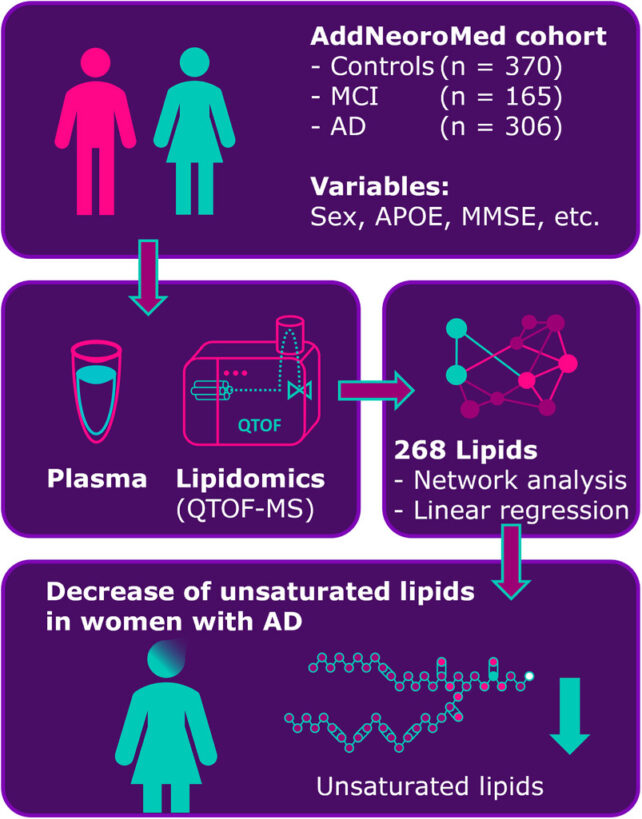There's something about the female brain that makes it more susceptible to Alzheimer's disease.
A new study suggests that 'healthy', unsaturated fats, like omega-3, may partly explain that discrepancy.
Compared to men, women typically have higher levels of omega-3 fatty acids, but in the current analysis, women with Alzheimer's showed a surprising dearth of these lipid molecules.
Related: This Mysterious Molecule Is Crucial to Brain Health, And We May Finally Know Why
The researchers did not find the same lipid changes in men with Alzheimer's compared to men without Alzheimer's, indicating that these fats may affect the disease differently based on sex.
The findings contribute to an overlooked hypothesis that has been around for decades, implicating fat droplets in Alzheimer's disease.
Historically, these lipids have been overshadowed by tau tangles and amyloid plaques; however, they, too, are hallmarks of the disease within the brain, indicating that fatty acid metabolism has somehow gone awry.
A recent Lancet Commission for Dementia estimated that 7 percent of Alzheimer's risk is attributed to high midlife levels of low-density lipoprotein, which carries cholesterol and fatty acids around the body.
This risk factor may explain why women develop Alzheimer's at twice the rate of men, according to the current study, led by researchers at King's College London.
The team looked at the lipid libraries of 841 participants across six European countries.
Compared to those with sound cognitive health or mild cognitive impairment, those participants with Alzheimer's disease showed significantly higher levels of 'unhealthy' saturated fatty acids, and significantly lower levels of healthy unsaturated fatty acids, like omega-3.
"Our study suggests that women should make sure they are getting omega fatty acids in their diet – through fatty fish or via supplements," says pharmaceutical scientist Cristina Legido-Quigley from King's College.
"However, we need clinical trials to determine if shifting the lipid composition can influence the biological trajectory of Alzheimer's Disease."

The research analyzed hundreds of individual lipids, which are carried in the blood by lipoproteins like LDL and HDL. In women, multiple lipids were associated with Alzheimer's disease and cognitive impairment. However, the same patterns were not observed in men.
Compared to healthy women, women with Alzheimer's showed a decrease in lipoproteins with attached omega fatty acids.
"While this study shows that women with Alzheimer's had lower levels of some unsaturated fats compared with men, further work is needed," says Julia Dudley, Head of Research at Alzheimer's Research UK, who was not involved in the study.
"This includes understanding the mechanisms behind this difference and finding out if lifestyle changes, including diet, could have a role."
Historically, there has been an extreme sex bias in brain aging research. In 2019, only 5 percent of published studies in the field of neuroscience or psychiatry analyzed the influence of sex.
What's more, many drug trials for Alzheimer's still do not analyze sex differences, even when they appear significant on the surface.
The result is that scientists don't know why women are more likely to develop Alzheimer's, or what to do about it. While women tend to live to an older age, even older men are less likely to develop this type of dementia than women of the same age.
"Understanding how the disease works differently in women could help doctors tailor future treatments and health advice," says Dudley.
At last, that research is coming.
The study was published in Alzheimer's & Dementia.
